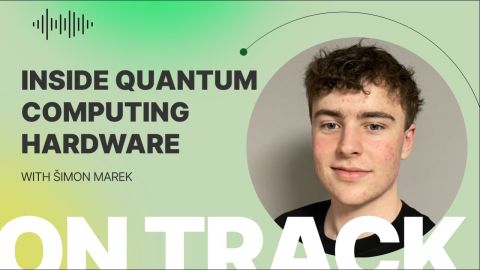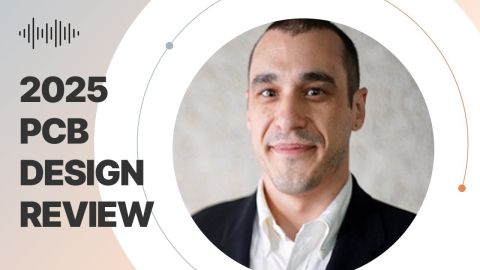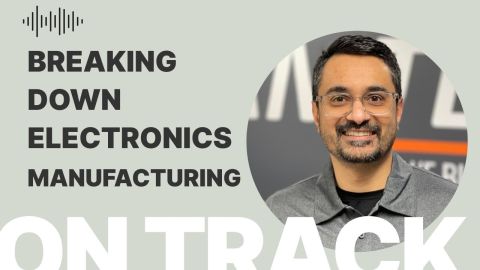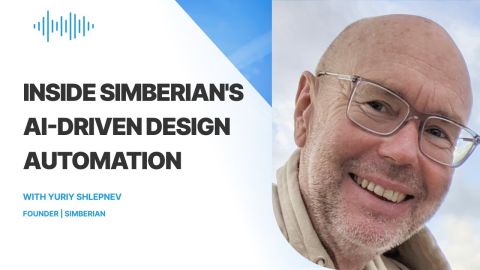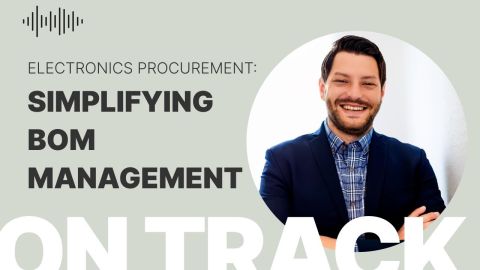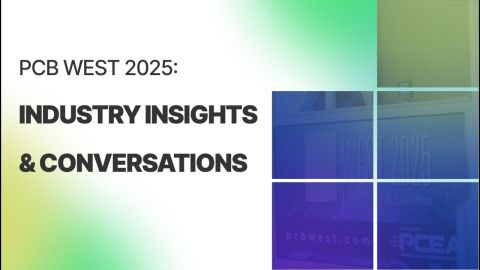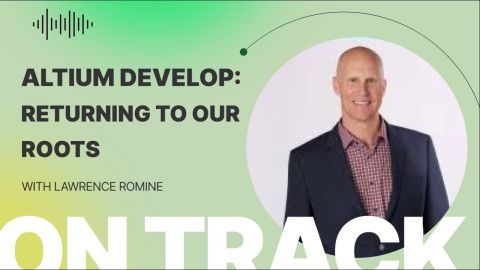Sales, Marketing, and the PCB Industry

Today we are joined by Dan Beaulieu, founder and owner of Db Management Group. He and Zach chat about the PCB industry's broad marketing trends including how it's stuck in the past, the declining trade show industry, how sales reps can stay relevant, and much more.
Listen to the Episode:
Watch the Episode:
Show Highlights:
- Intro to Dan Beaulieu
- Sales & Marketing Stuck in the Past
- Impacts of the Domestic PCB Base
- Is the Trade Show Method Going Away?
- How do Reps Stay Relevant?
- Focusing on Younger Designers
- How Manufacturers Stand Out from the Competition
- Designers and Board Shop Conflicts
- Importance of Touring Shops
- Capital Investment and PCB Shops
- Focus on the Customer's Need, Then Provide It
Links and Resources:
- Watch related episodes:
-
Read the related article: Assembly: The Last Step In The PCB Product Development Process
-
Connect with Dan Beaulieu on LinkedIn
Transcript:
Zach Peterson:
How does a PCB manufacturer stand out from the competition? Is it just purely on a technical basis? Is it something else with lead time, cost, what we can do for you?
Dan Beaulieu:
Being always a sales manager, I always said to the rest of the company, "Make sure the light bulbs work. I don't want to be apologizing. Make sure the quality is topnotch, the delivery is topnotch. And then let's do some educated technology that matches the market needs." So we do that. So let's assume that's there.
And then it's getting out there. I mean, I'll give a plug to I-Connect and also PCEA. These guys are putting out great content, and that's the important thing.
Zach Peterson:
Hello, everyone. Welcome to the Altium OnTrack Podcast. I'm your host, Zach Peterson. Today we're talking with Dan Beaulieu, founder and owner of D.B. Management Group. If you read I-Connect007, you probably have seen Dan's face in some articles, so I'm very excited to talk to him today. Dan, thanks so much for joining us.
I have been reading I-Connect for a long time. Your face periodically comes up. And what's interesting is, we don't normally talk to sales folks here on the podcast. We're usually talking to probably your clients, who are engineering firms, design firms, and then manufacturers. So maybe tell us a little bit about your background, and how you got involved in the electronics industry on the sales side.
Dan Beaulieu:
Okay. I've been involved for many, many years. I started with a Rockwell International facility here in Maine, actually. Maine back then was the China for California. All of Rockwell was in Southern California, they moved here. And I was fortunate... I was supposed to be an English teacher, by the way. And I was one afternoon in a classroom as a student teacher, and I said, "I am out of here. I'm not doing this."
Then looking for a job back in my day was harder to find jobs, and this company needed electroplaters, whatever that was, in Lisbon, Maine. And I stopped in, got a job immediately as what was called a production coordinator, a fancy Rockwell name for expediter. It was so long ago that we carried clipboards and followed PC boards around, we didn't have computers. And this was Rockwell, which in a way was, I learned later, was the Harvard of printed circuit boards at that time.
Did that, and then looked around and said, "Well, what can I do here?" Because there was a bullpen of eight or nine of us, long haired, almost college graduates, and they were picking us out of the bullpen to be engineers, supervisors. And that didn't look like fun to me. Everything was their fault all the time.
Being a right brain person, I went to the sales and marketing side. And I did that with Rockwell for eight or nine years. Then I went to work as a regional sales manager for a company called General Circuits, and then on to Automated System in Brookfield, Wisconsin, which was a high-end company for printed circuit boards.
But one of the things I realized was, every company had a director, a VP of sales and marketing, and it was 99% sales and 1% marketing. They did a brochure once in a while. Now, the company I was owned by was also owned by Cadence Design Systems out of Sunnyvale, and they taught me marketing. Which I already did. I mean, I was reading business books. I still read four business books a week. I write about it.
So I used my right brain side and decided, you know what, in 1995, '96, with another guy who was a manufacturing guy, Don Dawson, we started D.B. Management. And our thing was, Donny can build anything and I can sell anything. I can market anything. And that's how the D.B. Management Group started. The reason it's called group is I've got some other contractors who work with us side-by-side, 1099s.
So what D.B Management does is the strategic side of the business, which there's very little of. Most circuit board shops were started by manufacturing guys or operations guys or engineers, with not a lot of vent or interest in marketing at all. They don't like it that much. So I brought that to the party, because that's what I love to do.
Since then, that was '96, we've worked with 150 companies, not just PCB companies, but PCBA companies, suppliers. I've worked with Taiyo America. I've worked with RBB Chemical. At any one time, I'm working with five or six PCB shops and assemblers.
And interestingly, from your point of view, during my career with the Cadence board shops, I actually ran four design centers, although I don't know a lot about design, but I knew something about business. So I ran those as well.
My kids say I could sell anything. Go to a funeral home, and I can show them how to sell at the funeral home too. This is what I do, is I figure out a way to sell the products. What's going to make them special. What's going to make them outstanding.
I also at any one time can be acting sales manager for a couple of companies. I help training, compensation, incentive, anything to help a board shop. I've worked with large ones, but for the most part I'm working with 10 to $40 million companies at any one time. So that's pretty much the background.
Zach Peterson:
This is interesting you bring this all up, because I'm starting to think of how I have heard about most of the board shops I have worked with. And it's either they were local, so I met them at a local trade show. I might've met them at a bigger trade show like PCB West. Or I saw an ad in a publication I trust like I-Connect, or maybe some other website that I cater to or that I read often, and I contacted them and see if they could help me with something. And that's pretty much the extent of it.
And it almost feels like, for companies that are responsible for advancing technology, they're really stuck in the past when it comes to some of their sales and marketing efforts. I wonder how much of that is the issue that you identified with. Maybe they're started by engineers who aren't comfortable going out and doing that kind of thing and putting their best face forward, and how much of it is just they don't even know how to get started, even if they wanted to.
Dan Beaulieu:
In one of my columns, I've written a number of times, probably too many times, and I don't mean to be sarcastic, but a circuit board shop owner, if he gets in trouble with sales, he'll fire his salespeople and buy a new drill. Which is basically true. I mean, it's changed, but salespeople have always been kind of the necessary evil. I'm a champion of salespeople, I'm a champion of reps, and I'm a champion of marketing. Not to plug the magazine I work with, they've come a long way. I mean, you didn't see ads for PCB shops a while ago.
I remember, and I'll name them because I compliment them, Advanced Circuits in Colorado, now owned by APCT, were one of the first to do marketing. And my other owner friends were like, "Man, they're cheating." It was almost like doctors starting to advertise. It was like, "You're not supposed to advertise. You're not supposed to have ads in the back of the magazine. You're not supposed to send out..." If you bought something from Advanced Circuits, they'd send out a million postcards and they would track you down forever. Which I thought was clever, but everybody thought it was cheating back then. And it's only in the last I would say 10, 15 years that you're seeing companies do marketing. Actually, my business has boomed during it, because you're right.
Look, I'm not that interested in the product unless it's, I want unusual product, I want something to sell. I get it, they're not that interested in reading a marketing book.
So we compliment each other, we work together. I kind of am an owner whisperer, if you will. I usually go into a company with a specific thing like set up a marketing plan, a simple marketing plan, analog, LinkedIn, newsletter, that kind of stuff. But at the end of the day, my best clients, and some of them I've been with 27 years, I become more their trusted advisor than anything else. And then we end up doing a lot of things that weren't in the original contracts of deliverables.
Zach Peterson:
That makes a lot of sense. One other thing I'm wondering is, how much of this is related to, I guess, the shrinking of the domestic PCB base over time. And eventually people realizing, we now have to do this if we want to be competitive and relevant, and continue to drive sales. Is that a factor that plays into people's decision to go undergo a marketing campaign and maybe work with someone like yourself?
Dan Beaulieu:
It's a huge factor. It's a huge factor, Zach. In the sense, I mean, the numbers vary, but in the early '80s, they peaked at about, it could be 1,500 domestic PCB shops. There are now less than 180. Out of that 180, there are a couple, you know them, the big guys, the Summits, the TTMs who own 10 or 12 locations.
So it's getting tighter and smaller all the time. That is one of the reasons besides just saying, if you've got an outstanding product, you need to be found. One of the things I've said over and over again, I've written over 800 columns now. I've had 800 Sundays in a row pounding this. And my publisher Barry keeps saying, "You know, you write the same six things over and over again. How can you say them in different ways?" Which is basically what I-
Zach Peterson:
People won't get it, right?
Dan Beaulieu:
Yeah. And my friend Bruce always says, "Yeah, well, when you watch a football game, how many F-150 ads are on that football game?" Ford never gets tired of showing them. That's marketing. But in the end, build it and they will come, only works in baseball fields in Iowa. It does not work in business. You've got to tell people over and over again what you do.
And it's an exciting time. I love the content marketing. I love that, because it's not just lay an ad out there and what's it doing for you. It's, I call it trolling, is you write articles about what you're doing today for this special customer, and somebody's going to read it and say, "Well, if you could do this for them, then you can do this for us, this new project we have." So we do a lot of that as well.
And like I said, it's an exciting time. The board shops are getting more interesting and more interested in marketing. Not only that, the other aspect are the assembly shops. You've got your giants, your Flextronics, Plexus, and all that.
But the guys I deal with, the 10 to 25 million guys, they haven't had to do marketing. So many companies were started by what I call... They were like barnacle companies, I call them. I think that's a thing that sticks to the hull of a ship, a barnacle. Like the Honeywells, the Boeings, they would have a special product that needed assembly and they'd tell one of their trusted employees, "Go off and build a little shop, and we'll provide you forever with all the business you need." It was a good deal for them, and they would do that and it worked. Until one day, that big guy went away and said, "Well, I'm not using it anymore." And this happened like five, six years ago. Not that long ago. All of a sudden it's like, "Oh, man. We've got to go out and sell now?" And many of them didn't even have salespeople. They had program managers, and that's about it. So I'm starting to help those folks more and more.
And then in recent times, the designers, the small design service bureaus, are saying, "Hey, we've got to do something too. We've got to get our name out there." So I'm getting more calls from them as well.
Zach Peterson:
So do you think that the model with working with manufacturers' reps is going away as more of these companies maybe bring their sales operations in-house? Is the trade show method going away, or is the trade show outlet going to become less of a focus and more of a compliment to a broader strategy?
Dan Beaulieu:
Well, I love those two questions, because to me, they're softballs. I write about these all the time, and I have plans. I have a trade show plan, as a matter of fact, getting the most out of a trade show. It's very extensive, and it talks about don't act like you're having a big party, and the customer's going to invade the party. Trade shows will not go away as long as you use them properly, and that means preparing for the trade show. Nothing is accidental, every day is planned, what you're going to do with schedules and all of that.
And what drives me crazy is the lack of follow up. You spend all this money on a trade show, and you get the leads. I mean, they're as easy as heck to get the leads, and then you don't follow up. So if you do it right, I have a whole plan for that.
Now going to the reps, the way it is now is dying. Thanks for the setup, because we're even working on a new contract for reps. The contract doesn't work. My friends who own PCB shops hate me saying this, but it does not work. If you think about this, a rep is working on his own dime, driving his own car, his own American Express bill, and it's taking longer and longer to get that first order. Especially on the assembly side. The assembly side's three times longer than the board side. And then it's taking longer to get paid. The contracts now read, "You will get paid when I get paid." And these same owners are suffering because they're getting terms from their customers for 90 days, 120 days. So it's very, very common now for a rep to start with a company, go through the lead generation, the qualification, the survey, the first order, all of those things, it could be 10 months to 11 months before that rep gets paid.
So what I'm trying to do is convince people, pay for some activity, pay for that first quote, a few hundred dollars for the first quote, for the first order. And then another thing that would help, and nobody wants to do it, I'm going to convince somebody, is pay on shipment. Pay on shipment. I mean, the owners complain about, and they're a company, they're a $10 million company and they're complaining about the length before they get paid, nevermind the poor rep and his brother in a small rep firm, how long are they taking to get paid? They're another 60 days after their principal gets paid.
It's not lost. We need reps. Directs are expensive. In the end, they're better for a single company, but they're expensive. And I just think we have to treat reps better. I find reps for companies, and it's getting harder and harder. I've never met a rep who didn't have a horror story from a principal. Either he was too successful and was fired, or the principal went out of business and he's the last guy to get paid. So it's a tough business, but I think it can be saved, salvaged, because we need them.
Zach Peterson:
That's interesting. What does a rep have to do in order to stay relevant, especially given the changing landscape and how companies have the potential to reach people without reps?
Dan Beaulieu:
Okay. A rep has to say a relevant by providing the principal with what he wants. The whole relationship needs to be worked on. In the sense that the principal will bring a rep on with high expectations, meanwhile the rep comes on knowing it's going to be difficult to do. And by that I mean, often a principal will not define their sweet spot, what their ideal customer is, that kind of thing, and the rep goes out and finds her relationships, people she knows she can call on to bring in, and often it doesn't work, it doesn't fit. So there's that thing.
Then a lot of the reps need to step up and realize things like, no, they're not just relationship managers, they're reps. It means, with being a rep comes salesmanship, saleswomanship, comes cold calling, lead generation, that awful phone call, that first meeting, you got to do all of that. Just because you're carrying an AARP card, doesn't mean that's over for you. Because I've heard that. "No, I'm too old. I don't do that anymore." Well, somebody has to. You got to be introduced to a stranger who doesn't really want to buy what you want to sell, and not only be introduced, but sell what you're trying to sell.
I did a lot of work during Covid. I was doing a presentation called How to Sell When You Can't Visit Your Customers. It was really hard on salespeople that I trained, and I was really hard on them, because, "Well, we can't take them to lunch, so we can't sell." And I would say, "Is that it? Your whole product's a hamburger? The shop's not worth anything? There's no value in what the shop is doing? If you can't take them to play golf, you can't sell?" And we got through it. I couldn't be sympathetic. That's not my job. I had to say, "No, there are ways to do this. Let's go do it."
By the way, speaking of Covid, like Winston Churchill said, "It's a shame to waste a good crisis." That was a good crisis for marketing, because people had to figure out ways to sell without visiting customers. So marketing I think felt a boost, a boom, during Covid as well. People had to be found.
Zach Peterson:
This is a really interesting discussion on reps, because I think for the younger group of people who are coming into the industry and who aspire to one day maybe have their own board shops or to have a bigger design firm and work directly with manufacturers, they may not even know that the rep system exists until they go to a trade show. And then suddenly they walk up to a booth and someone says, "Oh, I'm a manufacturer's rep." Well, what's a manufacturer's rep? They have no idea. And that's how it was for me when I first learned about the rep system about five years ago. I had no idea that that was a thing.
Dan Beaulieu:
Well, a couple of things you touch on. I'm spending a lot of time getting young people into this industry. As is IPC. They're doing a good job at this. But a couple of things that I was fascinated on as a young man at Rockwell. First of all, I got fascinated by the equipment. They were just coming in with NC equipment. And I got fascinated with the product. If you think about it, we're building amazing stuff. Our product guided the shuttle, at Rockwell. The circuit boards guided the shuttle. They guided that missile that dropped into Saddam Hussein's chimney there. The electric car, the SpaceX.
What I want to do is get the young people excited about the product, and I find we're not excited about it. I mean, they'll say, "What are these green cards?" No, they're not green cards. A 28-layer blind and buried board is not a green card. It's not a piece of plastic. And I think we need to get the young people excited about that. We need to get the young people excited about their careers. You're not hiring a kid in plating. You're entering a career. A career, by the way, that a lot of us have made a great living off of.
And we've got to get them in. We've lost two generations. I mean, you've got old guys like me, and you've got 30-year-olds. There are very few 40-year-olds in the pack right now, because we just skipped that generation. Our generation won't die, typical boomer stuff, we're hanging around forever. And the young people, the last two generations were more software oriented than making and manufacturing oriented. It's like their younger brothers, or even in some cases their kids, are coming into the industry.
I mean, for example, a customer service person off the street going into a $10 million board shop, high school educated, will make more money than a starting salary for a teacher with a four-year education, expensive education. And then it goes from there. And we're an industry that home grows a lot of engineers, quality people, into the low six figures, in six, seven years. Well, I started at $2.65 an hour, so that's different. But a lot of salespeople right now, PCB salespeople, are topping out at 100, 110, and that's not the manager, that's the salesperson, besides the incentive package.
So it's a good career, we just have to broadcast that it's a good career. And it's something that matters and I know the young people have a much stronger conscience that we did about doing the right thing for the world and the ecology and all that and I admire that. And I don't allow anybody in my presence to use the M word, millennial. We didn't want to be stereotyped, we don't want to stereotype.
And then you wanted to talk about reps and young people. I think you're right. I think, I don't know, I'm kind of on a crusade to bring the reps back and help them to be stronger, because I think we need them. It's all a matter of educating them. I mean, there's ERA, they do a pretty good job. But I write a lot about reps. As a matter of fact, I'm doing a micro book about reps now, just based on the columns I've written. I also just finished one on hiring in this new generation. And give a plug to him, John Mitchell, whatever he is, the president I guess, the director president of IPC, has written a great book, Fire Your Hiring Habits.
Zach Peterson:
We actually had him on to talk about it.
Dan Beaulieu:
Yeah, I saw it. I saw it. I was looking at it the other day, and I saw it. I picked up the book because of that, and I'm reading it. I plan to review it in 007. It'll be more of a recommendation than a review, to tell you the truth. I think he did a great job there.
Zach Peterson:
Yeah. Very interesting to get his perspective. Being online, and having that ability to integrate an online strategy into your person-to-person sales strategy as a manufacturer, of course that lowers the barrier and everybody can be online now.
Now, given that's the case, how does a PCB manufacturer stand out from the competition? Is it just purely on a technical basis? Is it something else with lead time, cost, what we can do for you, service level basis? I'm wondering about this, because I think as young people come into the industry and I hope move into this area in manufacturing, because that's really where a lot of the market share is at, they're going to have to figure this stuff out, and figure out how can we differentiate ourselves.
Dan Beaulieu:
Absolutely. And first of all, being always a sales manager, I always said to the rest of the company, "Make sure the light bulbs work. I don't want to be apologizing. Make sure the quality is top-notch, the delivery is top-notch. And then let's do some educated technology that matches the market needs." So we do that. So let's assume that's there.
And then it's getting out there. I mean, I'll give a plug to I-Connect and also PCEA. These guys are putting out great content, and that's the important thing. I'll give an example of one company I work with. They did a micro book on flex and rigid flex, because they wanted to grow that business. All due respect-
Zach Peterson:
I think I know who you're talking about.
Dan Beaulieu:
I can say, it's ASC, American Standard, because I worked with them and I was part of that. Now, I love American Standard. They're one of my favorite customers. They were not the leaders in flex and rigid flex. But we put out this book. It was a sophisticated system to download, as you know. I think it's had 5,000 downloads. They have assumed the position of one of the leaders of flex and rigid flex, and their flex and rigid flex business is booming, where it was fledgling when we started this. I mean, there are stories where their salespeople walked into a meeting, and there were six engineers holding up their book. Talk about brand identification and identification of product.
That's the most direct marketing results, return on investment, I can give you, that story right there. Because other than that, it's like old Wanamaker in Philadelphia said. He says, "I know half of my advertising is working, I just don't know which half." And in this case, you really, really knew which half was working. And I see a lot of that. Now people are using the books. They're using webinars.
I know of two other companies, one of them, I'll name them, is Sunstone. The other one is Millennial, where they grew their business without salespeople. They did it all with digital marketing. And they're both 20-ish million now, from scratch. From scratch, you know?
Zach Peterson:
Yeah, Sunstone is right down the road from me and I know some of the folks over there, and they're great.
Dan Beaulieu:
Yeah, they're great, and actually they just merged with my guy, American Standard. So I got insight and I don't mind saying, they knew what they were doing with the whole digital marketing plan.
And I was exposed, I worked a little bit with Millennial in Harrisburg, same thing. I was amazed when I went there, their search engine optimization and all that.
Giving you a long answer, but you can't just be technology. I'll refer to it again. Build it and they won't come. You've got to tell them that you've built it, and that's what these guys are doing. And that's how you become... First you're outstanding then you go tell somebody you're outstanding. That's how it works.
Zach Peterson:
I think part of that is, it makes it much easier for an engineer who is not intimately familiar with the manufacturing process to make a decision. Because if you start looking at 5 or 10 different manufacturers that, maybe you found them on LinkedIn or maybe you found them on Google or you saw an ad or whatever, and you start trying to dig into how they're different, analysis paralysis can set in.
So how do you make a decision? How do you choose the manufacturer that's going to be best for your company, your budget, your lead time, all of these different factors? And it sounds like some of these initiatives, which are kind of simple, really just make it easier for somebody to say, "Here's my credit card."
Dan Beaulieu:
It is. That's a whole other category. By the way, the column I just finished this morning is, stop falling in love with certainty. Stop falling in love with certainty. Because I just started Walter Isaacson's biography of Elon Musk, and talk about a hatred of certainty. There you have it.
But let me back up a little bit, and I'll give them a plug, one of the things I like about Altium is they have brought the manufacturing and the designers together and they work hard at that, and I love that. I ran design centers. I ran design centers, they had a board shop. And most of the designers had never been in the board shop. They didn't know how a board was built. And they had an arrogance about... Go ahead.
Zach Peterson:
I still see that. I still see that. Some of the companies I work with, they've got a staff of five engineers or whatever. Those guys don't know how to build boards.
Dan Beaulieu:
But they have an arrogance about, "It's just a job shop. Just shut up and build the card. Why are you asking all these questions? Build it the way I designed it." And I followed Altium and I know what they're doing and they do a lot of that.
[NEW_PARAGRAPH]And I admire that because that's the future. Especially with new product introduction and speed, we're going to have to work concurrently. Designers are designing the board, sending information over to the shop before it's ready, and then sending over information for the components. I'm working with a company right now that's going to introduce that at PCB West next week, their whole designer connection, designer toolkit and all of that. I can say, that's Sierra. They're going to be pushing that hard. They've been spending a lot of time on that.
But Altium does it, and I think that's really important. If you're a designer, it's important you walk through a board shop, it's important you understand the ramifications of choosing this laminate versus that laminate, especially in times of shortages, and then in times of economies and speed and just the price of the board, things like that. I'm not sure that answered your question.
Zach Peterson:
No, but actually you brought up something important, which is actually take a tour of a manufacturer's shop if you get a chance. And actually, when I was at PCB West, I think 2019 or 2021, I forget which year, but I actually had an opportunity to go through Summit's facility on a guided tour, and that was really cool. I've been through a few PCB shops just getting tours, but that one was pretty cool to see.
Dan Beaulieu:
That's very cool. That's the old Streamline?
Zach Peterson:
I think so. Yeah. It's right there in Santa Clara.
Dan Beaulieu:
Yeah, Streamline, my friend Mike was over there. Yeah, that's a great example. Sierra's another... If you think of the equipment intensivity of these shops, it's incredible. I know of two shops right now. One is Alpha, the other one is Amitron. They're dropping 20, $25 million of equipment into their shops as we speak. Not to mention GreenSource in Charleston, New Hampshire, and Schweitzer in Idaho, where they've just spent millions and millions and millions of dollars on shops of the future.
So it's so equipment intensive, so capital intensive. That was why there are only less than 200 shops anymore. We were fighting for margins and we were fighting to upgrade. And our customers were saying, "Upgrade your equipment." Really, how? How do we upgrade our equipment?
Zach Peterson:
Yeah, that's a big challenge I know for a mom and pop shop. I mean, how are they going to get the investment if it's not out of their own back pocket?
I wonder if that number of shops is actually going to decrease despite the nearshoring onshoring macrotrend, because it is so capital intensive and M&A starts to kick in, and some of these smaller shops get bought up or they merge in order to try and stay competitive. Do you see that happening?
Dan Beaulieu:
The number is what I'm stuck on. Will it go up or go down? A couple of trends are happening right now. And full disclosure, I work M&A with GP Ventures. I help them out once in a while just as my networking. And there are always people looking for people all the time.
Right now, there's a trend for people from offshore to come here and buy shops. We're seeing that more and more, which is a little more difficult right now to do.
But I think what I was seeing is the two companies I mentioned, they're investing that kind of money. But not everybody can do that. And I am not going to talk a lot about it because I don't know a lot about it, but the CHIPS Act was supposed to be some trickle down money into the PCB shops. I don't know if that's happening. Like I said, I don't know a lot about it. If somebody does, that would be a great interview.
But I think what's going to happen is we're going to keep playing Pac-Man, like we're playing. We're going to keep doing that, and those shops will get stronger and they will invest in the equipment.
And in terms of the onshoring, well, I'm a globalist first of all. I don't understand this whole animosity with China. I'm not political, I'm business. I've gone over to China and meet those people and Taiwan, and now you're seeing a lot of Thailand, Vietnam, it's all coming on. And India, I've got two companies I'm working with in India for not a lot of money just to understand their market and what they're doing because I think I need to do that.
Zach Peterson:
I've actually had a couple of folks starting companies in India asking questions. It's coming online as we speak.
Dan Beaulieu:
Yeah, I would love to meet them because I just want to know more about it. I'm not making a lot of money off it, it's interesting to me. The whole globalization thing is interesting. And so I think, as Thomas Friedman said, "The world is getting flatter and it'll keep getting flatter." I mean, we'll have anomalies like the stupid Russian War, which is dumb. It breaks Friedman's theory that no two countries with McDonald's would ever have a war, because we've broken that theory.
But on the same token, I think those are anomalies. I think overall Europe and North America are coming together. It's all coming together. Some people say that's a rosy theory, but I think money rules in the end, working together rules in the end, and solves problems in the end.
I think the domestic market, the domestic production I'd rather call it, will increase in the United States. Do I see million square foot eight story board shop campuses here? I don't think so.
But then again Zach, that isn't what it takes anymore. Charleston, New Hampshire is running with 30 people and smartphones. Same thing is happening with Schweitzer in Idaho. It's so automated that you don't need that anymore. You don't need all the people. We talked about factory 4.0, now we're talking about factory 5.0 where it's cooperation between the robots and human beings, which I like better. But you still need a lot fewer people, and once you've invested in the equipment...
It used to be the average ratio annually was $100,000 a head. So if somebody was doing $5 million, they had 50 people. You tried to figure that out. That's changed drastically. The ratio is much better now. I know I'm saying this publicly, but they can correct me if I'm wrong, I think Charleston is doing over 40 million with 30, 35 people now.
Zach Peterson:
That's incredible.
Dan Beaulieu:
Yeah. So it's not as intense. You've got the internet of things. You've got the full automation. You've got the sharing. People think blockchain is just about crypto, it's about everything. The vaccine was developed using blockchain of an open forum. Every scientist learning what they learned. Like the autonomous vehicles. If an autonomous vehicle gets in an accident in Tokyo, I just found this out, gets in an accident in Tokyo, all the other autonomous vehicles in the world learn of that accident and start repairing themselves or preparing themselves to not have that happen again. Just amazing stuff.
Zach Peterson:
Well, we have time for one more question, and this kind of relates to one of the broader macrotrends that we kind of touched on, which is onshoring and nearshoring. I think if you're a PCB manufacturer and you're trying to bring in new business, there may be a temptation to market to or message to that macrotrend. We typically do it or see it with technologies, right? People want to capitalize on a tech trend. They'll say, yeah, we build that, and that makes sense. But I think when it's more of these higher level business trends, there's also that temptation to extend your messaging in that direction. Should manufacturers try to differentiate themselves and maybe capture some of that market by speaking to that macrotrend, or do you think that's off limits for local PCB manufacturers? Should they stick to their core technical strengths?
Dan Beaulieu:
Well, I think they should stick. But I got a little lost. Are you talking the macrotrend of onshoring inshoring? Or what are you talking about with macrotrend?
Zach Peterson:
Yeah. I'm talking about speaking maybe to the benefits and saying that, "We can help you achieve those benefits. And this is all good for your business." That kind of thing. That's how I've seen the messaging play out recently.
Dan Beaulieu:
What is going on regardless is, first you focus on the customers, what do the customers need, and then you provide it. I've helped people go from a brick and mortar domestic shop and add a global solution to it. I don't think there's anything wrong with that. You create a partnership with somebody in China, this has been going on for years, and I think it works perfectly well. Because at the end, if you're a PCB supplier, you're a PCB supplier. Why be retained by the brick and mortar? As far as a bank is concerned, they just care about the top line and the bottom line. They don't care if 25% of your business was done with offshore partner suppliers. So that's how you treat that trend, and I believe your customers are a lot more comfortable with that because they know something goes wrong, you've got your brick and mortar, they can take care of it. They've gotten used to, if you have it hopefully, great customer service. They know they're going to deal with customer service.
I'm working with somebody right now who's doing global sourcing of other products, other commodities. And the marketing we're doing for them is, it's scary out there. Going to China is not for sissies. You're not even going to drive a car in China. I was in China once for a week and the hotel was real fancy, and I couldn't figure out if I was going to be able to afford it or not because I couldn't get the price right of, what is this hotel room costing me every night? You need pros to do that. Unless you're a giant. IBM, they don't need the $10 million, $20 million board shop to take them to China. They were there before it was cool.
But what we need is, it's almost your friends, your suppliers to take you to China so you don't have to. Because maybe you have several products that you want a better price on, a better economy.
And I think there's that that's going on. That's one trend that American board shops are partnering with those suppliers. And the other one, they're partnering with their design brothers and their assembly sisters to provide a complete solution. Covid taught us that we have shortages and we need to take care of ourselves, and as much as I love the other countries, you shouldn't be going right away with your proprietary products. You should be building them here with Harry down the street who builds your boards and Joe who's designing them and Mary who's assembling them, and put it all together. Because customer wants one transaction, one purchase order, take care of it. "Here's my idea, I want the product in three weeks, two weeks."
So that's my answer to that. I hope that's what you were looking for.
Zach Peterson:
No, that's helpful. I think that's a great NPI strategy.
Well, thanks so much for being here with us today. This is really interesting, and hopefully we can talk again soon.
Dan Beaulieu:
I loved it. Yeah, let's do it again. I'd love to.
Zach Peterson:
Great. Thank you so much.
Dan Beaulieu:
Thank you, Zach.
Zach Peterson:
To everyone that's out there listening or watching on YouTube, we've been talking with Dan Beaulieu, founder and owner of D.B. Management Group.
If you are watching on YouTube, make sure to hit the subscribe button, you'll be able to keep up with all of our podcast episodes and tutorials as they come out. And last but not least, don't stop learning, stay on track, and we'll see you next time. Thanks everybody.

